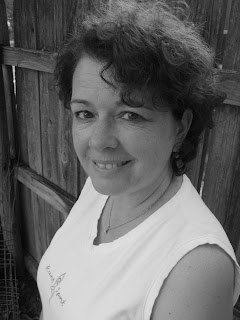
My sister and I also loved to hear his Scar Stories. He has two.
Chopping wood with his father. With an ax. "What’s an ax?" (We’re city girls.) Foot slipped. Ankle cut “near in two”. His mother held him tight while the doctor sewed it back without anesthesia. The scar on his arm is from glass from a window that was struck by lightning while he sat in his desk, a little boy in elementary school.
These three things were emblems of adventure, courage and manhood. Since my father was the only male in the entire extended family, these things formed my earliest thoughts of the differences between boys and girls.
His father died when my father was just 12, having spent the last few months in the chicken coop out back before dying in a TB sanitarium in North Carolina.
High school didn’t hold his interest as much as some ne’er –do- wells that were taking him “down the primrose path.” His mother, raising him and his sister alone, saw the danger. Took action. Signed for him to join the Navy at 17, which he preferred to being drafted into the Army.
He was on Saipan, stood on the site where the 5000 Japanese jumped to their deaths rather than be captured. He got his tattoo. “Why an eagle?” I asked him just the other day. “I looked around for the cheapest thing. It was just $5.00.”
After four years in service he went to Kansas City to Radio School. While there, he was a short-order cook in a greasy spoon, once making a meal for Harry Truman. To this day his default meal when my mother doesn’t cook is a fried egg sandwich.
Job prospects for radio engineers became dim as televisions rolled off the assembly line, so he and a friend joined a traveling sales team who sold magazine subscriptions door to door.
In Missoula, Montana, their boss ran off, taking everything they owned. Indignant, they marched, or I should say, hitchhiked to the home office of Stars and Stripes in Washington State, demanding restitution.
“We don’t have anything to do with independent contractors,” the office said. He wired for bus fare and went home. Unfortunately, this wasn’t to be the only time he trusted an unscrupulous business man.
He and my mother began their life on a wing and a prayer. Well, maybe just a wing. They eloped. She was 19; he was 22. “Why did you do that?” “I don’t know. It’s just what people were doing in those days. Nobody had any money. You just found a preacher and got married.”
He bought “Good Night, Irene” for $100. No windows. No brakes. Soon it wouldn’t even make a right turn. He still laughs ‘til he cries as he relates trying to turn off busy Union Avenue. He’d have to turn a little; put the car in reverse, back up, turn a little more, taking about seven such maneuvers to complete the turn, cars honking, people cursing.
I was born after eight years of trying, he always says tenderly and proudly. My sister two years after that. He worked as a traveling salesman, a manufacturer’s rep for auto parts. No doubt he missed a lot, as did we, by this arrangement, but this was the job that he could get. These were the days when people stayed with a company for years; when personal fulfillment took second place to providing for family.
Perhaps it’s his nature, perhaps it’s the years alone on the road, but he’s content to be alone with his TV and books, though he wants my mother close by. Last week, while we were waiting for the outcome of my mother’s cancer surgery, I asked him about their courtship.
“I married your mother because she was so gregarious and fun. I didn’t have an outgoing personality.” That statement is the only time I’ve ever heard him say anything approaching self-analysis.
He’s among a dwindling number of men unaffected by the self-help movement, by feminism, by the post WWII me-generations. He grew up in a time when what it meant to be a man was clear and simple. I’m sure he never questioned it, never thought to question it. He just was.
My daughter complained that a certain young man didn’t even know how to change the oil in his car. “It’s just not very manly.”
“Well, what is a man, anyway?” I ask her, relishing a possible teachable moment. I’d just read John Piper’s, Recovering Biblical Manhood and Womanhood and was ready. “It has nothing to do with changing the oil.”
“I don’t know,” she actually said.
“I know you don’t know because nobody knows anymore, but I know, and so I’ll tell you.”
A man takes responsibility for the things and people around him. There is a sense of duty, to see that things are taken care of, made better. He does the hard things, the dangerous things, the dull things, without complaint. Because as husband, father, son, son-in-law, brother, or citizen, this is what’s needed.
“So, no, it’s not unmanly if he can’t change the oil. It’s unmanly to ignore it.”
In my teens, I went to work at Young Life camp in Colorado for a month. My father insisted I take his brand-new Delta 88, choosing the older car for himself. I can say about my father that in my entire life, whenever I’ve had a need, asked for anything, he has never once said, “No, I can’t. I’m too busy.”
They say we learn, for good or bad, what God is like from our earthly father. If so, the best thing I’ve learned from my father is,
When I call, the answer is always, without hesitation, “Sure, hon, I’ll be glad to.”



No comments:
Post a Comment